This event, co-organized by Religions for Peace, the World Council of Churches, the Anglican Communion and the Episcopal Church, and supported by the United Nations Environment Programme (UNEP), featured “how” and “why” religious leaders across faiths are increasingly involved in protecting the rights and spiritualities of indigenous peoples – from the Artic to the Equator – to achieve the goals of the Paris climate agreement.
Opening Session
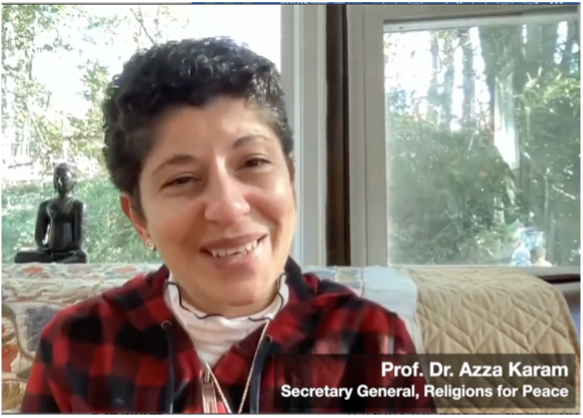 The event was opened by Prof. Azza Karam, Secretary General of Religions for Peace, who highlighted the Interfaith Rainforest Initiative (IRI) as a powerful example of religious leaders mobilizing to protect tropical rainforests and the rights of indigenous peoples, saying “IRI was launched at the Nobel Peace Center in June 2017 as an international alliance that works to harness the moral influence of religions and their leaders for the protection of rainforests and the rights of indigenous peoples. They go together: We protect our lungs, we protect indigenous peoples”.
The event was opened by Prof. Azza Karam, Secretary General of Religions for Peace, who highlighted the Interfaith Rainforest Initiative (IRI) as a powerful example of religious leaders mobilizing to protect tropical rainforests and the rights of indigenous peoples, saying “IRI was launched at the Nobel Peace Center in June 2017 as an international alliance that works to harness the moral influence of religions and their leaders for the protection of rainforests and the rights of indigenous peoples. They go together: We protect our lungs, we protect indigenous peoples”.
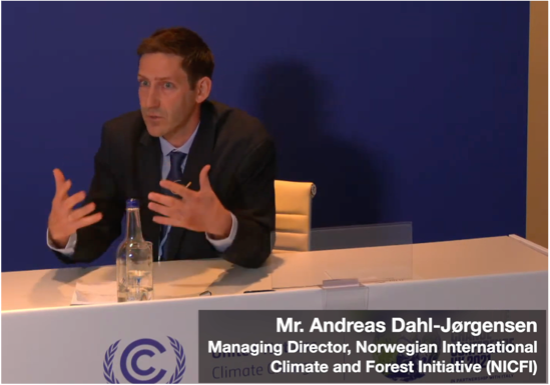 This statement was followed by an official announcement by the Government of Norway to continue their support of the Interfaith Rainforest Initiative for the coming three years. Mr. Andreas Dahl-Jørgensen, Director of the Norwegian International Climate and Forest Initiative (NICFI) added “not only are religious leaders adding a very important ethical supplement to the reasons for why we should protect forests, they also promote the actions that are needed” and further highlighted that faith leaders and communities “play a critical role in addressing the root causes of the destruction of our nature, along with indigenous peoples”.
This statement was followed by an official announcement by the Government of Norway to continue their support of the Interfaith Rainforest Initiative for the coming three years. Mr. Andreas Dahl-Jørgensen, Director of the Norwegian International Climate and Forest Initiative (NICFI) added “not only are religious leaders adding a very important ethical supplement to the reasons for why we should protect forests, they also promote the actions that are needed” and further highlighted that faith leaders and communities “play a critical role in addressing the root causes of the destruction of our nature, along with indigenous peoples”.
 Dr. Tom Clements, Strategic Policy Advisor to the Secretary of State and Lord Goldsmith of the United Kingdom, highlighted the strong commitment of the UK as President of the COP to put the forests and indigenous peoples agenda at the heart of the climate discussion and to deliver on the Glasgow Leaders Declaration on Forests and Land Use, an historic commitment that represents one of the most signficant outcomes of COP26. He further highlighted that a coalition of 14 governments and private donors are committing US$1.7 billion specifically to support indigenous peoples over the next 5 years.
Dr. Tom Clements, Strategic Policy Advisor to the Secretary of State and Lord Goldsmith of the United Kingdom, highlighted the strong commitment of the UK as President of the COP to put the forests and indigenous peoples agenda at the heart of the climate discussion and to deliver on the Glasgow Leaders Declaration on Forests and Land Use, an historic commitment that represents one of the most signficant outcomes of COP26. He further highlighted that a coalition of 14 governments and private donors are committing US$1.7 billion specifically to support indigenous peoples over the next 5 years.
 The Right Reverend Dr. Marc Andrus, Bishop of the Episcopal Diocese of California and Head of Delegation for COP26 for the Episcopal Church emphasized that his church has engaged in a deep assessment of the Doctrine of Discovery, that has shaped the Christian worldview and, essentially, gave permission to white men to dominate and enslave indigenous peoples. In doing so, he explained how this process is reshaping the churches’ vision on the intersection between justice and race and their openness to discover a positive new future of collaboration and reconciliation with indigenous peoples.
The Right Reverend Dr. Marc Andrus, Bishop of the Episcopal Diocese of California and Head of Delegation for COP26 for the Episcopal Church emphasized that his church has engaged in a deep assessment of the Doctrine of Discovery, that has shaped the Christian worldview and, essentially, gave permission to white men to dominate and enslave indigenous peoples. In doing so, he explained how this process is reshaping the churches’ vision on the intersection between justice and race and their openness to discover a positive new future of collaboration and reconciliation with indigenous peoples.
 Chief Rabbi David Rosen, International Director of the Department of Interreligious Affairs, American Jewish Committee and Co-President of Religions for Peace elaborated on the intrinsic link between love for God and care for creation and its creatures. Considering the unprecedented and global threats to nature and climate, Rabbi Rosen highlighted that multireligious collaboration has become a high moral imperative. To that end, he expressed his pride in having supported the launch of the Interfaith Rainforest Initiative in Oslo (2017) and endorsement of the Faiths for Forests Declaration and Action Agenda (2019) and noted: “I am truly inspired by the progress that has been made globally and in the program countries, and I am profoundly grateful to the government of Norway for investing in the Interfaith Rainforest Initiative, and hope that other governments and organizations will follow suit”.
Chief Rabbi David Rosen, International Director of the Department of Interreligious Affairs, American Jewish Committee and Co-President of Religions for Peace elaborated on the intrinsic link between love for God and care for creation and its creatures. Considering the unprecedented and global threats to nature and climate, Rabbi Rosen highlighted that multireligious collaboration has become a high moral imperative. To that end, he expressed his pride in having supported the launch of the Interfaith Rainforest Initiative in Oslo (2017) and endorsement of the Faiths for Forests Declaration and Action Agenda (2019) and noted: “I am truly inspired by the progress that has been made globally and in the program countries, and I am profoundly grateful to the government of Norway for investing in the Interfaith Rainforest Initiative, and hope that other governments and organizations will follow suit”.
Second Session:
In this session, indigenous speakers from Anglican Christian and Lutheran religions shared their view of a deeply interconnected world and spoke out about the abuse of their cultures and ecosystems and called for solidarity, advocacy and action from allies.
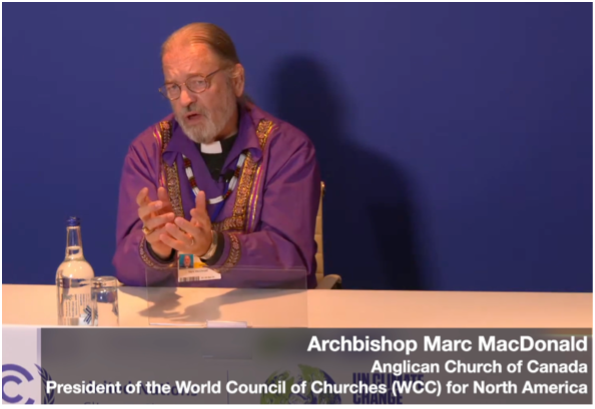 Archbishop Marc MacDonald of the Anglican Church of Canada, President of the World Council of Churches (WCC) for North America, noted: “An estimated 80% of the biodiversity of this planet is under the oversight, protocols and the life of indigenous people […] There is no livable future for this planet that does not address the rights of indigenous peoples in a way that has not happened in modern times. The way of life that we will need in order to have a livable planet is also found within indigenous life and philosophy […] so it is absolutely critical to understand that indigenous people and their life stand in a prophetic relationship with humanities future. Let us listen, let us take heed, let us understand, for in this we will find life.”
Archbishop Marc MacDonald of the Anglican Church of Canada, President of the World Council of Churches (WCC) for North America, noted: “An estimated 80% of the biodiversity of this planet is under the oversight, protocols and the life of indigenous people […] There is no livable future for this planet that does not address the rights of indigenous peoples in a way that has not happened in modern times. The way of life that we will need in order to have a livable planet is also found within indigenous life and philosophy […] so it is absolutely critical to understand that indigenous people and their life stand in a prophetic relationship with humanities future. Let us listen, let us take heed, let us understand, for in this we will find life.”
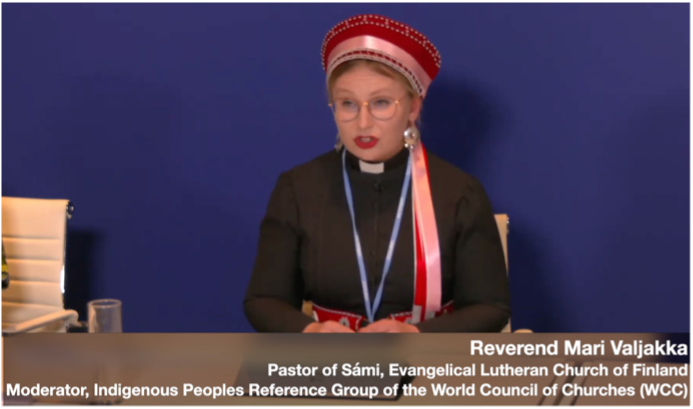 Reverend Mari Valjakka, Pastor of Sámi at the Evangelical Lutheran Church of Finland and Moderator of the Indigenous Peoples Reference Group of the World Council of Churches (WCC), highlighted that “our land is sacred to us, it gives us life and shelter, it is our home and our church. We have a connection to the land and wisdom to share, but our knowledge has been devalued. We think that indigenous perspectives are crucial not only for addressing the climate emergency but also for navigating the way forward to a hopeful post-COVID, post-growth and post-fossil-fuel future.”
Reverend Mari Valjakka, Pastor of Sámi at the Evangelical Lutheran Church of Finland and Moderator of the Indigenous Peoples Reference Group of the World Council of Churches (WCC), highlighted that “our land is sacred to us, it gives us life and shelter, it is our home and our church. We have a connection to the land and wisdom to share, but our knowledge has been devalued. We think that indigenous perspectives are crucial not only for addressing the climate emergency but also for navigating the way forward to a hopeful post-COVID, post-growth and post-fossil-fuel future.”
Third Session:
This session explored the Interfaith Rainforest Initiative (IRI) as a best practice in faith-based action for the protection of forests and the rights of indigenous peoples, with a focus on how religious leaders and organizations are mobilizing behind the initiative in Brazil, Colombia, Democratic Republic of Congo (DRC), Indonesia and Peru.
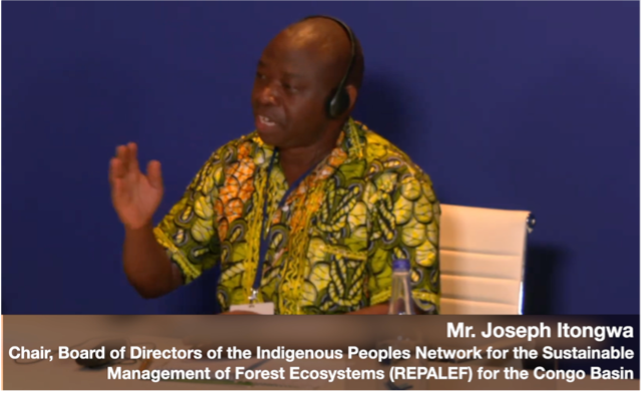 Mr. Joseph Itongwa, Chair of the Board of Directors of the Indigenous Peoples Network for the Sustainable Management of Forest Ecosystems (REPALEF), highlighted how the Interfaith Rainforest Initiative represents a new strategic alliance in DRC that – for the first time in history – offers a platform for indigenous peoples and forest communities to work together with religious leaders on the protection and restoration of forests and on securing the rights and entitlements of indigenous peoples. As an example, he noted that “the strong support and advocacy of religious leaders led to the adoption of a national law on the protection of indigenous people’s rights”. He further noted that the Interfaith Rainforest Initiative is expanding its work into the provincial and local level, establishing action coalitions where forests face the greatest risks to get religious leaders advocating for public policies that respect indigenous peoples’ rights. Mr. Itongwa ended by stating that the indigenous peoples “continue to applaud the work of the Interfaith Rainforest Initiative at national, provincial and local levels”.
Mr. Joseph Itongwa, Chair of the Board of Directors of the Indigenous Peoples Network for the Sustainable Management of Forest Ecosystems (REPALEF), highlighted how the Interfaith Rainforest Initiative represents a new strategic alliance in DRC that – for the first time in history – offers a platform for indigenous peoples and forest communities to work together with religious leaders on the protection and restoration of forests and on securing the rights and entitlements of indigenous peoples. As an example, he noted that “the strong support and advocacy of religious leaders led to the adoption of a national law on the protection of indigenous people’s rights”. He further noted that the Interfaith Rainforest Initiative is expanding its work into the provincial and local level, establishing action coalitions where forests face the greatest risks to get religious leaders advocating for public policies that respect indigenous peoples’ rights. Mr. Itongwa ended by stating that the indigenous peoples “continue to applaud the work of the Interfaith Rainforest Initiative at national, provincial and local levels”.
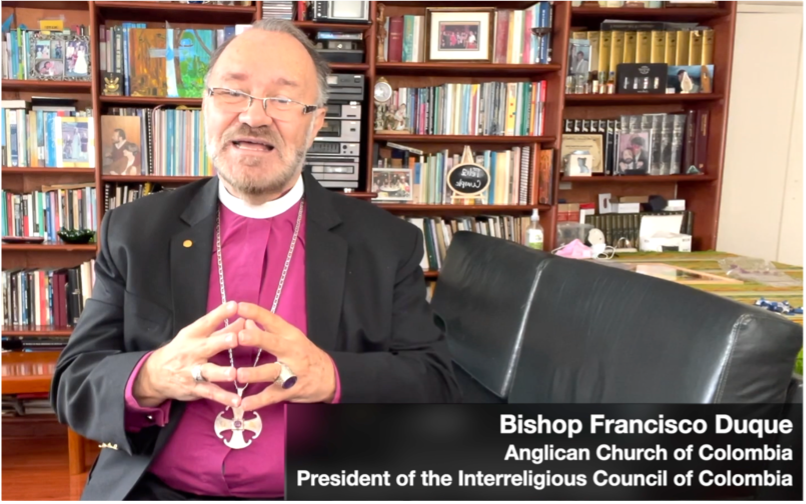 Bishop Francisco Duque, Anglican Church of Colombia and President of the Interreligious Council of Colombia, noted that the Interfaith Rainforest Initiative has active country programs in Brazil, Colombia, DRC, Indonesia and Peru and that they are united by a shared commitment of getting religious leaders into action for the protection of forests, nature and the rights of indigenous peoples. He then focused his comments on the remarkable progress being made through IRI Colombia, relaying that since its launch in late 2018, the program has created action coalitions or “local chapters” in the 36 Amazonian municipalities most affected by deforestation. He noted that the local chapters of IRI have trained thousands of religious leaders and supported the development of action plans and advocacy strategies to protect the Amazon. Bishop Duque also gave examples of how IRI Colombia is working to influence public policies on forests and the rights of indigenous peoples, citing their success embedding a commitment to stopping deforestation in the National Development Plan and ensuring passage of the recent Law 2111, which elevated the seriousness of deforestation as a crime in the criminal code. He ended his remarks by validating the commitment made by the Government of Norway to provide continued support to the Interfaith Rainforest Initiative, suggesting it is a program that is bringing unique value to the coalition of partners working to halt and reverse tropical deforestation around the world.
Bishop Francisco Duque, Anglican Church of Colombia and President of the Interreligious Council of Colombia, noted that the Interfaith Rainforest Initiative has active country programs in Brazil, Colombia, DRC, Indonesia and Peru and that they are united by a shared commitment of getting religious leaders into action for the protection of forests, nature and the rights of indigenous peoples. He then focused his comments on the remarkable progress being made through IRI Colombia, relaying that since its launch in late 2018, the program has created action coalitions or “local chapters” in the 36 Amazonian municipalities most affected by deforestation. He noted that the local chapters of IRI have trained thousands of religious leaders and supported the development of action plans and advocacy strategies to protect the Amazon. Bishop Duque also gave examples of how IRI Colombia is working to influence public policies on forests and the rights of indigenous peoples, citing their success embedding a commitment to stopping deforestation in the National Development Plan and ensuring passage of the recent Law 2111, which elevated the seriousness of deforestation as a crime in the criminal code. He ended his remarks by validating the commitment made by the Government of Norway to provide continued support to the Interfaith Rainforest Initiative, suggesting it is a program that is bringing unique value to the coalition of partners working to halt and reverse tropical deforestation around the world.
Distinguished Discussants
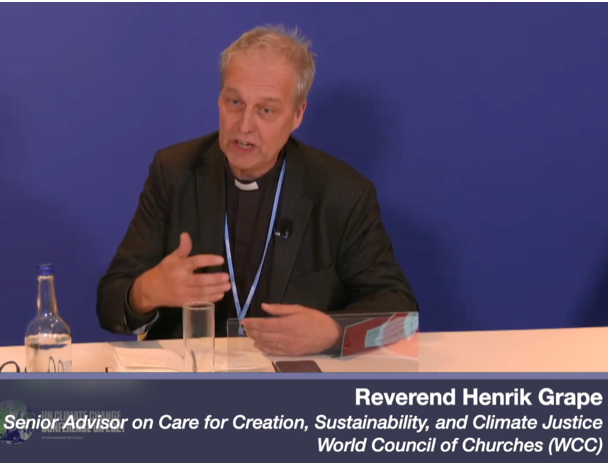 As a distinguished discussant, Rev. Henrik Grape, Senior Advisor on Care for Creation, Sustainability, and Climate Justice of the World Council of Churches (WCC) commented “We are not apart from nature, we are a part of nature, and to make peace with Earth is to make peace on Earth”. He further added that “we have to reclaim the knowledge of our interdependence with ecosystems and we have to leave this extractive economy that we built. We cannot do this without being led by indigenous spirituality” and advocated for all the churches and faith traditions to embrace this knowledge in order to overcome the climate threat and the deforestation crisis.
As a distinguished discussant, Rev. Henrik Grape, Senior Advisor on Care for Creation, Sustainability, and Climate Justice of the World Council of Churches (WCC) commented “We are not apart from nature, we are a part of nature, and to make peace with Earth is to make peace on Earth”. He further added that “we have to reclaim the knowledge of our interdependence with ecosystems and we have to leave this extractive economy that we built. We cannot do this without being led by indigenous spirituality” and advocated for all the churches and faith traditions to embrace this knowledge in order to overcome the climate threat and the deforestation crisis.
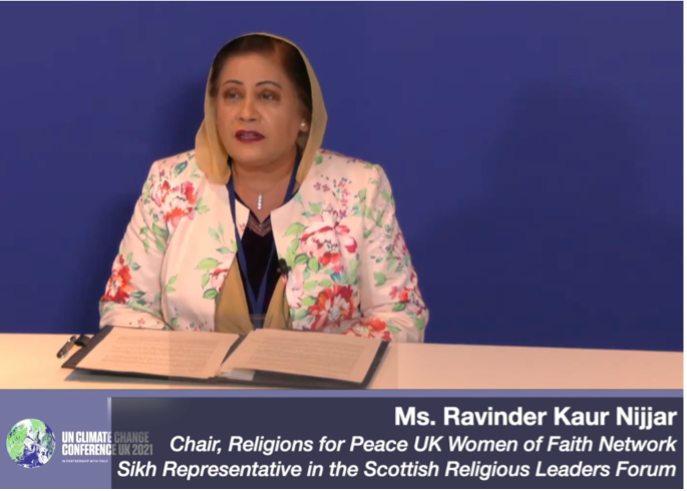 Ms. Ravinder Kaur Nijjar, Chair of the Religions for Peace UK Women of Faith Network and Sikh Representative in the Scottish Religious Leaders Forum, highlighted that a Women of Faith Statement was recently produced by women faith leaders around the world, affirming their commitment to work with the Interfaith Rainforest Initiative and recognizing that there is no solution to the climate crisis without protecting the rainforests and its indigenous peoples. She added that “women have been the caretakers of our environment across all cultures and, particularly, indigenous women have nourished our biodiversity and ecosystems and recognize that all forms of life are sacred. We cannot as custodians of the planet allow the destruction and devastation of life.”
Ms. Ravinder Kaur Nijjar, Chair of the Religions for Peace UK Women of Faith Network and Sikh Representative in the Scottish Religious Leaders Forum, highlighted that a Women of Faith Statement was recently produced by women faith leaders around the world, affirming their commitment to work with the Interfaith Rainforest Initiative and recognizing that there is no solution to the climate crisis without protecting the rainforests and its indigenous peoples. She added that “women have been the caretakers of our environment across all cultures and, particularly, indigenous women have nourished our biodiversity and ecosystems and recognize that all forms of life are sacred. We cannot as custodians of the planet allow the destruction and devastation of life.”
 Rev. Rachel Taber-Hamilton, Shackan First Nation and Episcopal Church representative, shared her insights about the ‘clash of cultural stories’. As an example, she highlighted how the ‘Doctrine of Discovery’ is a story that – while brought to us by European explorers from the 15th and 16th century – is still in play today and that “said it was God’s will to do genocide, to enslave people and to essentially eradicate entire environments for commercial gain”. She added that “unless our theologians of all kinds begin to listen closely to the theologies of indigenous peoples, we will not survive as a race and as a world. In those stories of creation, there is relationship with place, with other, with plants and with animals that sees and frames the world that God has created as deeply and profoundly sacred. That is the relationship for which everybody hungers, and that story is actually the true story of Christianity.”
Rev. Rachel Taber-Hamilton, Shackan First Nation and Episcopal Church representative, shared her insights about the ‘clash of cultural stories’. As an example, she highlighted how the ‘Doctrine of Discovery’ is a story that – while brought to us by European explorers from the 15th and 16th century – is still in play today and that “said it was God’s will to do genocide, to enslave people and to essentially eradicate entire environments for commercial gain”. She added that “unless our theologians of all kinds begin to listen closely to the theologies of indigenous peoples, we will not survive as a race and as a world. In those stories of creation, there is relationship with place, with other, with plants and with animals that sees and frames the world that God has created as deeply and profoundly sacred. That is the relationship for which everybody hungers, and that story is actually the true story of Christianity.”
 Dr. Charles McNeill, Senior Advisor to the United Nations Environment Programme (UNEP) and moderator for the event, offered concluding points: “Today we explored how indigenous peoples – north and south – share ways of life and traditional knowledge that all life on the planet depends on. We also confronted the fact that there is no effective solution to the climate crisis without respecting and ensuring the rights and spirituality of indigenous peoples. And significantly, we learned that religious leaders and faith communities are now supporting this agenda more strongly than ever. For me, the most inspiring insight from today’s session is seeing that religious leaders and indigenous leaders are forging a powerful new alliance of mutual respect and cooperation that brings enormous new energy and resources to the global effort to avert a climate catastrophe.”
Dr. Charles McNeill, Senior Advisor to the United Nations Environment Programme (UNEP) and moderator for the event, offered concluding points: “Today we explored how indigenous peoples – north and south – share ways of life and traditional knowledge that all life on the planet depends on. We also confronted the fact that there is no effective solution to the climate crisis without respecting and ensuring the rights and spirituality of indigenous peoples. And significantly, we learned that religious leaders and faith communities are now supporting this agenda more strongly than ever. For me, the most inspiring insight from today’s session is seeing that religious leaders and indigenous leaders are forging a powerful new alliance of mutual respect and cooperation that brings enormous new energy and resources to the global effort to avert a climate catastrophe.”
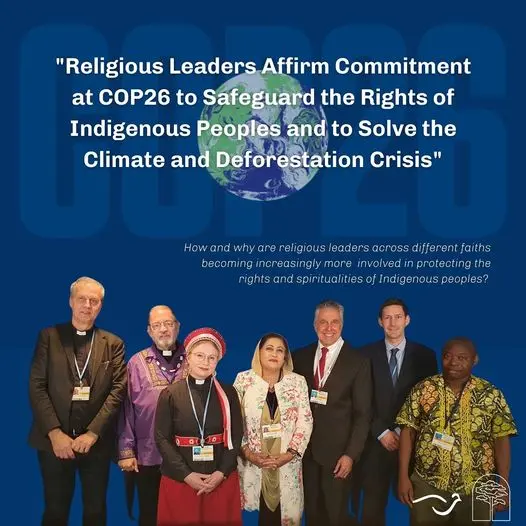
(left to right): Rev. Henrik Grape, World Council of Churches (WCC); Archbishop Marc MacDonald, Anglican Church of Canada, President of the World Council of Churches (WCC) for North America; Reverend Mari Valjakka, Pastor of Sámi at the Evangelical Lutheran Church of Finland and Moderator of the Indigenous Peoples Reference Group of the World Council of Churches (WCC); Ms. Ravinder Kaur Nijjar, Chair, Religions for Peace UK Women of Faith Network and Sikh Representative in the Scottish Religious Leaders Forum; Dr. Charles McNeill, Senior Advisor on Forests and Climate, United Nations Environment Programme (UNEP, Moderator); Mr. Andreas Dahl-Jørgensen, Director of the Norwegian International Climate and Forest Initiative (NICFI); Mr. Joseph Itongwa, Chair of the Board of Directors of the Indigenous Peoples Network for the Sustainable Management of Forest Ecosystems (REPALEF)
Source
Image Source
Tags: Making Peace with Nature: Heeding the Call of Indigenous Peoples

